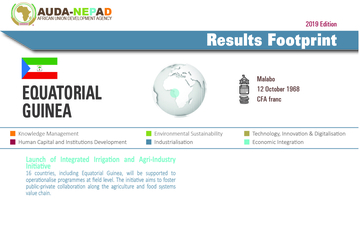 Equatorial Guinea
Equatorial Guinea
Official Name: Republic of Equatorial Guinea
Capital: Malabo
Independence Day: 12 October 1968
Currency: CFA franc
Key Result
Equatorial Guinea is expected to benefit from the Transmission-Central African Interconnection Transmission Line Project, which entails the construction of a 3,800 kilometre transmission line system from the DRC to South Africa through Angola, Gabon, Namibia and to the north to Cameroon, Chad and Equatorial Guinea.
The country joined the SE4All Initiative which aims to ensure universal access to modern energy services, double the global rate of improvement in energy efficiency, and double the share of renewable energy in the global energy mix. To support this process, the SE4ALL Africa Hub partners led the development of Africa Guidelines for SE4ALL national Action Agendas.
The country signed the CAADP Compact in 2013, committing to prioritise agricultural transformation and development. An Independent Technical Review of the country’s National Agricultural Investment Plan (NAIP) and agriculture public expenditure studies were conducted.
According to the CAADP Biennial Review Report, the country has made progress in the CAADP completion process evidenced at 57%. Equatorial Guinea further recorded 10.5% of public agriculture expenditure as a share of total public expenditure; 7.6% annual growth of the agriculture value added (agricultural GDP); 80% of farm, pastoral, and fisher households are resilient to climate and weather related shocks; and 34% increase of the size of irrigated areas, from its value of the year 2000.
Captured comprehensive information on Science, Technology and Innovation (STI) and consequently built in-country capacity to collect, analyse & publish data and information on research & development (R&D) and Innovation. In-country training and engagements on STI data collection, innovation management, analysis and dissemination were provided.
Related
Projects

A critical AU Model Law aimed at harmonizing medical products regulatory systems in Africa was endorsed by African Heads of State and Government at the January 2016 AU Summit in Addis Ababa, Ethiopia. The AU Model Law will contribute towards accelerate the regulation of safe, quality and affordable medical products and technologies in Equatorial Guinea.
Central Africa has embarked on a collaborative framework that will stipulate the activities, roles and responsibilities for implementing an MRH programme in the region. Equatorial Guinea is participating in a mapping exercise in 2016 that shall establish regulatory systems that will guide ECCAS and OCEAC Member States in setting up an MRH programme.

CAADP Compact: Equatorial Guinea signed the CAADP Compact on 5 December 2013.
Capacity Building: NEPAD supported Equatorial Guinea in conducting an Independent Technical Review (ITR).

Project : TAH programme
Description : This is phase I of the continental connectivity programme that focuses on completion and standardisation of the TAH missing links by 2030
Project : Single African Sky phase 1 (design and initial implementation)
Description : Single African Sky is a continental programme that will create a high-level, satellite-based air navigation system for the African continent
Project : Yamoussoukro Decision implementation
Description : Accelerate Yamoussoukro Decision implementation by identifying countries that are ready to fully implement it, and discussing and agreeing with both their governments and airlines to launch the voluntary club on a full membership basis;
Project : Central African Interconnection
Description : 3,800 km line from the DRC to South Africa through Angola, Gabon, Namibia and to the north to Equatorial Guinea, Cameroon and Chad
Project : ICT Enabling Environment
Description : This programme would improve the environment for the private sectors to invest in high-speed broadband infrastructure
Project : ICT Terrestrial for Connectivity
Description : This programme has two main components : secure each country connection by at least two broadband infrastructure and ensure the access to submarine cable to all landlocked countries
Project : Internet Exchange Point (IXP) programme
Description : The aim of this programme is to provide Africa with adequate internet node exchange to maximise internal traffic


Results (2013 – 2015)
Advocacy and Strengthening of Negotiation Capacities on Post-2015 Development Agenda through the Common African Position (CAP):
• The multi-stakeholder framework of engagement specifically enhanced dialogue towards ensuring the required mass to influence the Post-2015 Global Agenda and Development Goals relevant to the Continent;
• This intervention helped strengthen country and regional level negotiating capacities for the effective incorporation and articulation of Africa’s priorities as enshrined in CAP in the final Global SDGs;
• The project enabled the participation of African stakeholders at the Means of Implementation Engagement, 3rd Financing for Development Conference and the UN General Assembly that adopted the new SDGs. This ensured the incorporation of Africa’s development priorities into the new goals through developing essential negotiation capacities;
• Through the CAP/SDGs space on the Africa Platform for Development Effectiveness (APDev), knowledge products and negotiation documents, as well as, policy briefs where successfully disseminated to the African negotiators in New York and kept the continent’s stakeholders informed of the overall process;
• Development and dissemination of post-2015 Policy Briefs on “Financing and Partnerships” and “Structural Economic Transformation and Inclusive Growth”. These are priorities outlined in the CAP and the policy briefs where utilized in the negotiation process for the African continent.
Global Partnership for Effective Development Cooperation (GPEDC):
• Africa secured the hosting of the 2nd High Level Meeting (HLM) of the Global Partnership. This was attained through robust negotiation and facilitating a common voice from Africa with regards to this critical engagement by the NEPAD Agency. The 2nd HLM will be held in Nairobi Kenya;
• The NEPAD Agency advocated for the full inclusion and participation of Africa’s Regional Economic Communities (RECs) in conducting the 2nd GP Monitoring Exercise. This was a fundamental achievement considering the RECs are the continent’s building blocks with regards to socio-economic transformation;
• The Africa Action Plan on Development Effectiveness (AAP) was granted the status of an official Global Partnership Initiative (GPI) at the Planning Meeting in Brussels. The AAP was developed by the NEPAD Agency in consultation with African multi stakeholders. This has enabled the Agency to successfully mobilize resources towards the implementation of the AAP.

Description : The use of political gravitas and goodwill to unblock and facilitate political bottlenecks affecting the implementation of ICT broadband and optic fibre projects on the continent


"At the beginning of 2014, 37 of the 42 opted-in African countries have completed a rapid assessment / gap analysis. The next step for countries is to develop a SE4LL Action Agenda and Investment Prospectus(es). To support this process, the SE4ALL Africa Hub partners have led the development of Africa Guidelines for SE4ALL national Action Agendas. The Africa Guidelines lay out principles and process for developing Action Agendas and put forward a balanced approach of centralized and decentralized solutions to achieve universal access to energy services.
Progress in Equatorial Guinea:
Joined SE4All initiative"
you agree to the AUDA-NEPAD Privacy Policy.


